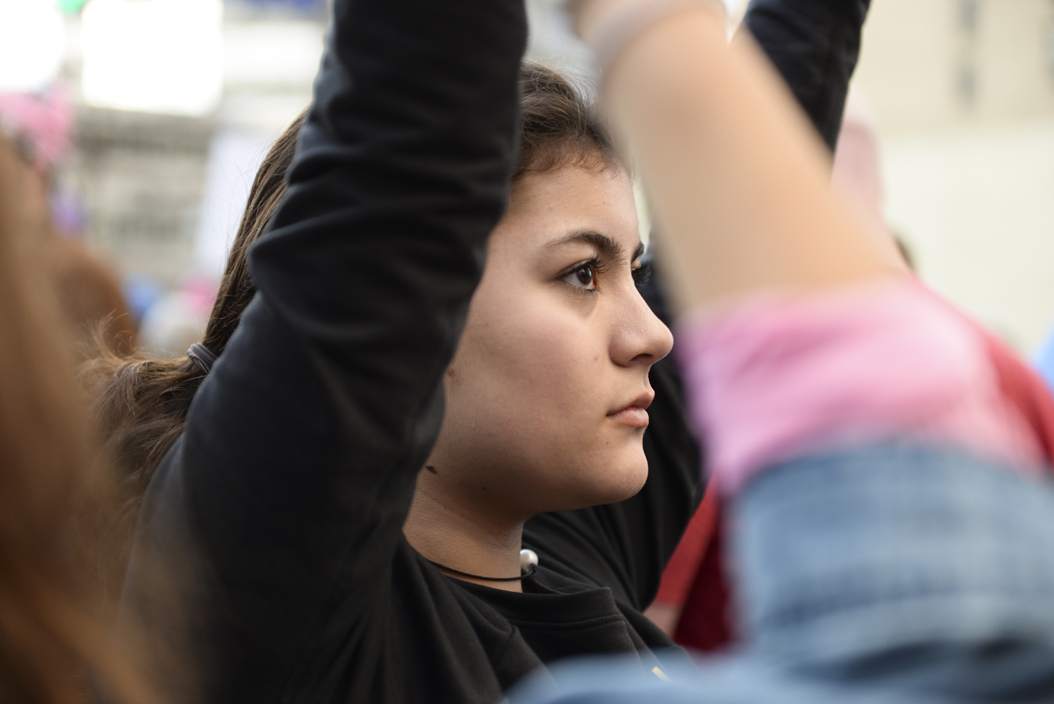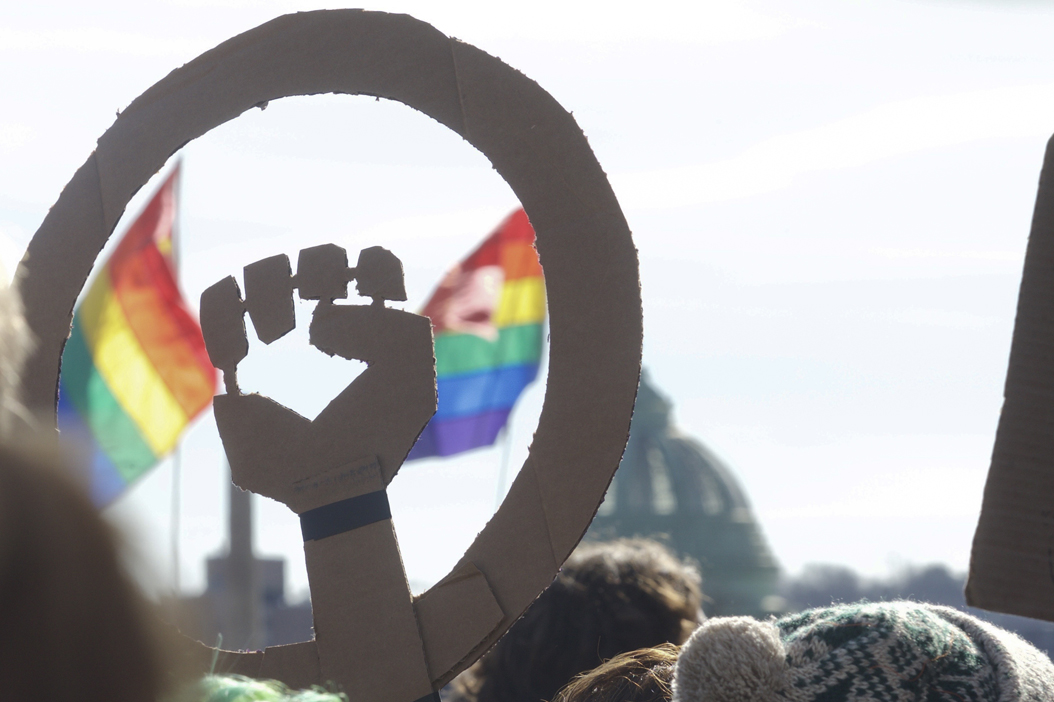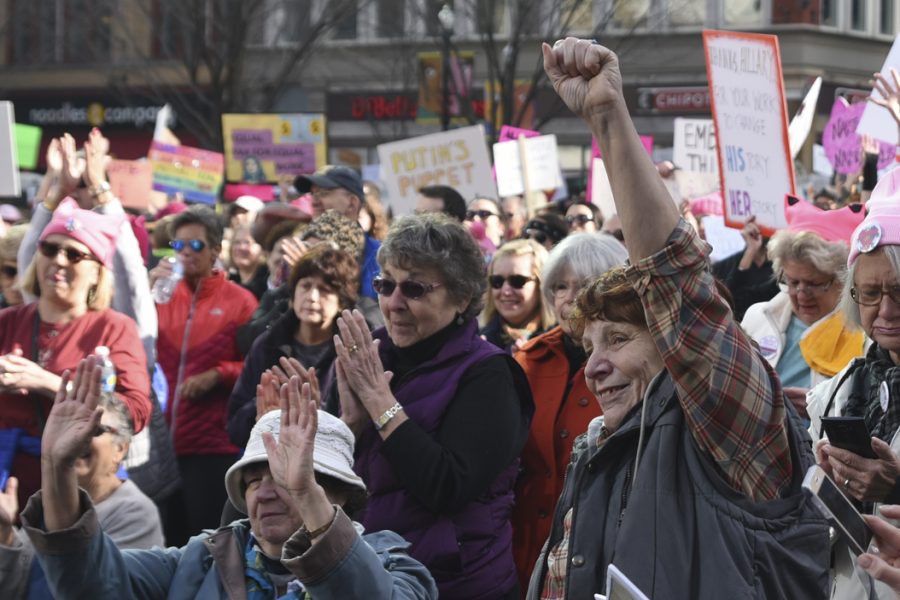While hundreds of thousands flocked to Washington, D.C., for Donald Trump’s inauguration and the Women’s March, thousands of Pittsburghers voiced support, disagreement and commitment to change and to one another right here in the once-Steel City.
At the Freedom Corner in the Hill District, Pittsburghers took their own oath to change. Others gathered in the August Wilson Center Downtown to commemorate former President Barack Obama’s legacy as an alternative to viewing Trump’s inauguration. Thousands of people — from in and around Pittsburgh — marched Downtown in solidarity with the women’s marches in D.C. and around the world.
After issues with the inclusivity of the Pittsburgh’s women’s march, some Pittsburghers opted to march in an “Our Feminism Must Be Intersectional” rally in East Liberty.
#FreedomCorner – follow it @ThePittNews pic.twitter.com/UzCX1d2ndn
— rebecca (@peters_becca) January 20, 2017
The People’s Inauguration Party — Freedom Corner
While Trump placed his hand on the Bible in Washington D.C., people united at the circular memorial — known as Freedom Corner — at the intersection of Centre Avenue and Crawford Street Friday to take the same oath. The oath, meant to keep activists committed to change and create new activists, simply replaced “president” with “citizen.”
OnePA, an organization that works to promote civil rights, hosted the People’s Inauguration Party, drawing a crowd of 60 people at the same time of the Trump’s inauguration.
Before traversing the memorial, people ventured to neighboring streets to devour donuts, toting signs that said “dump Trump, not health care” and “never be a spectator of unfairness or stupidity.”
Ringa Sunn of Squirrel Hill joined the the group for the first time. After protesting every weekend during the Bush Administration, Sunn is no stranger to political demonstrations.
“We’re here for ourselves,” Sunn, 33, said. “After a series of terrible things, Trump’s election is the crown jewel.”
Sunn printed buttons reading “Not My President” over Trump’s face and handed them out during the People’s Inauguration Party Friday.
She also advocated for health care and Planned Parenthood. After the citizen inauguration, representatives from the Census Group, the Education Rights Network, the Labor Council for Latin American Advancement, the Sierra Club, Fight for $15 and Planned Parenthood offered the community ways to get involved.
“People deserve the basic human right to be alive,” she said.
Rev. Dr. Curtis from Mt. Ararat Church “He has earned the rights to be considered the greatest President we have ever had” @ThePittNews pic.twitter.com/A10AmFph66
— Alexis Y. Carter (@AYC_PhD) January 20, 2017
Inauguration Day Alternative — August Wilson Center
The country’s first African-American president spent the day participating in a peaceful transition of power. But people at the August Wilson Center for African-American Culture wanted to reminisce on the Obama family’s last eight years in power.
About 50 people filled the theater seats to watch an hour-long documentary highlighting some of Obama’s biggest triumphs — including the capture and killing of Osama Bin Laden, the legalization of same-sex marriage and the passing of the Affordable Care Act.
The documentary ended with a loving image of the first family — Sasha in her mother Michelle’s embrace, and Barack with the same hold on Malia — as the dimmed lights raised. The event host, Sala Udin, a Hill District native who recently received a Presidential Pardon from Obama, walked on stage and introduced the next portion of the event, which he called “Who got next?” The open mic series that followed gave audience members an opportunity to express what Obama’s legacy meant to them and their commitment to “Fight Back.” They also spoke against right-wing politics and the devaluation of democratic values.
Tracey McCants Lewis, professor of law at Duquesne University for nine years, took to the mic to express her commitment to protect civil liberties.
“We don’t know what’s coming in these next four years, but we need to continue the fight,” McCants Lewis said.

Women’s March on Pittsburgh — Downtown
Activists walked through downtown Pittsburgh chanting, “Love, not hate, makes America great” in the early afternoon Saturday.
Participants held up posters, many featuring cats — a reference to Trump’s comments hot mic comments to Billy Bush. They called for political representation, reproductive rights and support of the LGBTQ+ community and other minority groups.
In solidarity with the march in Washington, D.C., about 5,000 men, women and children protested in downtown Pittsburgh Saturday for the Women’s March — which started at Forbes Avenue and Grant Street and ended in Market Square with speeches, patriotic sing-alongs and a moment of silence.
Valencia natives Steve and Kris Reutzel said that they were there, not just for themselves, but for the future of their children. They said they understand that raising their daughter, Logan, and son, Fisher, to love others is especially important given the current political climate.
According to Kris, 38, the morning after the presidential election, Logan, five, woke up and could not understand why Hillary Clinton lost.
“Logan asked me, ‘Mommy, why would we make someone mean the president?’” Kris said.
Steve, carrying a poster reading “Don’t tread on my daughter,” and Kris explained to their children that what is said or done is not always right.
“I was looking for daughter to have positive role model in Hillary Clinton, but now she has a misogynist role model instead,” Steve, 42, said. “It’s going to take an extremely active community to keep us from going back 50 years.”

Our Feminism Must Be Intersectional Rally — East Liberty
After an online dispute between feminists in the city, an alternative to the Women’s March on Pittsburgh congregated in East Liberty for the Our Feminism Must Be Intersectional Rally.
The rally began at Penn Plaza apartments, where a petition to build a Whole Foods was just denied in a big win against gentrification of the neighborhood.
The crowd had grown to about 1,300 people by 11 a.m., as newcomers streamed down Penn Avenue to join in. Organizers set the tone, shouting, “This is a celebratory space, we don’t have to be so serious, you can dance!”
When organizers of the Women’s March on Pittsburgh deleted comments asking about inclusivity from the event’s Facebook page, others, like Fat Femme and Fly 412, fought back with a march centered specifically on intersectionality — feminism that includes issues that affect women of color, trans women and gender-nonconforming people.
Nico Levallos, 26, from Friendship, stood calmly by the back of the field, next to a heart shaped balloon that simply read “I love you.”
“I wanted to support this group. It was a cause I could get behind,” Levallos said, referencing claims that other rallies were not completely inclusive. “I would be upset to support something that sort of only existed through silencing dissent. Even if it was in the name of unity or whatever.”
Following performances by drummers, poets and speakers, including some musical numbers by LiveFromTheCity, the mass of people took to Penn Avenue. and began their march toward the Pittsburgh Theological Seminary, where the Summit Against Racism was taking place.
Alexis Russell, 33, of Penn Hills, prepared to march with three of her oldest daughters. After a divisive presidential election, she felt motivated to bring them out for their first march.
“I think we’ve seen a lot of division, a lot of hatred, a lot of nasty things going on,” she said. “Recently, especially. And if we don’t utilize each other it’s gonna be problematic, we’re not going to win.”
Though Russell appeared to be in good spirits during the march, she was quick to admit her concerns for the future.
“I think most of that fear is I don’t know what to expect,” Russell said. “I’m here with three of my daughters and I have two more little girls and a little boy at home … and they’re watching and they’re seeing and they’re hearing and they’re scared too. So I kind of have to make sure that they know that they’re supported and that’s why we need each other.”
Alexa Bakalarski, Ashwini Sivaganesh, Rebecca Peters, Alexis Carter, Zoe Pawliczek and Max Datner contributed reporting.


